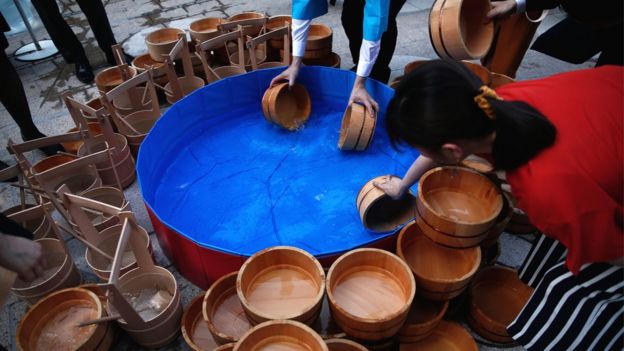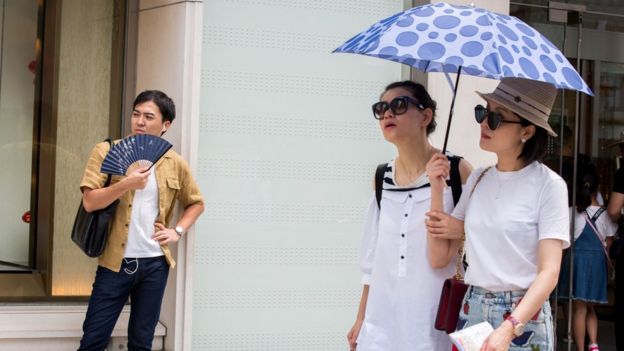
Temperatures in Japan have hit a record high, with officials issuing a fresh warning to stay safe.
Japan has for days been in the grip of a deadly heatwave, although the numbers reported killed vary widely from 15 to as high as 40.
On Monday, the thermometer peaked at 41.1C (106F) in Kumagaya, near Tokyo, breaking the previous national record of 41C from 2013.
More than a dozen cities have seen temperatures of about 40C.
Japan's disaster management agency urged people to stay in air-conditioned spaces, drink water and rest to prevent heat exhaustion.
"People in areas where temperatures are as high as 35 degrees or higher should be extremely careful" to avoid heatstroke, a meteorological agency official told news agency AFP.
"And even at lower temperatures, the heat can be dangerous for small children and elderly people, and depending on the environment and activities you are doing," the official warned.
In Yokohama, a city south of Tokyo, people took part in an event known as uchimizu, or "water ceremony" - pouring or sprinkling cold water on to the hot pavements in an attempt to cool them.

People fill wooden buckets with water before pouring it over pavements in an attempt to cool the streets
Already this summer, more than 10,000 people have been taken to hospital as a result of the heat, according to the country's Kyodo news agency.
On Monday, a number of senior citizens died as a result of the intense heat in prefectures surrounding Tokyo, according to the local authorities.
A day earlier, the Tokyo Fire Department dispatched ambulances some 3,125 times within the capital, the largest figure for a day since it began emergency services in 1936, as heatstroke and exhaustion contributed to emergency calls, AFP reports.
Tokyo's governor, Yuriko Koike, said the recent heatwave was "exactly like living in a sauna".

More than a dozen cities have seen temperatures of about 40C
The previous high was the 41C recorded in the western prefecture of Kochi in August 2013, the Japan Meteorological Agency says.
The current heatwave being the hottest on record has raised some concerns about the 2020 Summer Olympics in Tokyo.
Olympic officials and Tokyo's local government have been discussing measures from solar-blocking paint on roads to mobile misting stations to tackle the heat.
Ms Koike said the concerns were not just for the athletes participating in the games, but for spectators "who are cheering on the road".
"Countermeasures against heat is one of the major pillars for the success of the 2020 Olympics," she told reporters at a press conference on Monday.